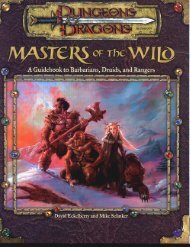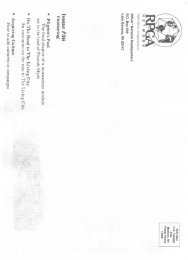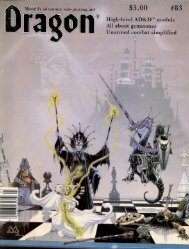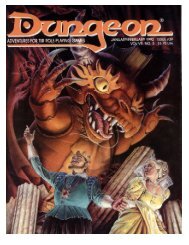Accessory - Dragon Magazine #111.pdf - Index of
Accessory - Dragon Magazine #111.pdf - Index of
Accessory - Dragon Magazine #111.pdf - Index of
Create successful ePaper yourself
Turn your PDF publications into a flip-book with our unique Google optimized e-Paper software.
you is subject to your rules. If players don’t<br />
wish to have their PCs’ powers altered or<br />
reduced, they don’t have to play in your<br />
game. Players may have their PCs weakened<br />
only for the duration <strong>of</strong> their stay, or<br />
they may accept permanent alteration <strong>of</strong><br />
their PCs. Make sure the players are informed<br />
<strong>of</strong> this before they bring in their<br />
characters. A favorite technique <strong>of</strong> mine is<br />
to have the means <strong>of</strong> arrival to my world<br />
(gates, spells, mystic explosions, summonings,<br />
etc.) be the means <strong>of</strong> their alteration.<br />
For example, NPCs may take magic items<br />
in trade for transporting characters to my<br />
world, good gods may “cleanse” evil characters<br />
so they can adventure with good<br />
ones, mystic explosions may alter characters<br />
in attributes and levels, and dimensional<br />
“police” may forbid certain items to be<br />
brought into my world.<br />
If, despite everything, your campaign has<br />
characters far beyond the rest in terms <strong>of</strong><br />
personal power, other options exist. The<br />
easiest solution for me was to craft adventures<br />
with a very tough, central adversary<br />
surrounded with lesser underlings. As a<br />
matter <strong>of</strong> course, a powerful character<br />
would seek out a fight with the major foe,<br />
while everyone else mopped up the lesser<br />
beings. The tough guy needed the help<br />
because he would have been swamped<br />
otherwise. Everybody fought, everyone was<br />
busy, everyone was happy.<br />
Another way is to create adventures in<br />
which a character’s power is useless. An<br />
adventure requiring the solving <strong>of</strong> riddles is<br />
one example,-since-the player must depend<br />
on his own cleverness, rather than the character’s<br />
power, to solve problems and finish<br />
the scenario. This balances things well for<br />
everyone.<br />
If a character is still too powerful for a<br />
particular group, there are other measures<br />
that can be taken. The DM can talk to the<br />
controlling player, who may agree that<br />
something should be done to make things<br />
more workable. It could be a matter <strong>of</strong> —<br />
giving up some items or taking voluntary<br />
cuts in some powers or abilities. The character<br />
could be retired until the rest <strong>of</strong> the<br />
group catches up, or it could be played with<br />
a more powerful group, if one exists. Or the<br />
character can go adventuring alone, which<br />
gives the DM a chance to make more demanding<br />
adventures without killing weaker<br />
characters.<br />
The character may also be run as an<br />
NPC by the DM if the player agrees. The<br />
DM would then assume control <strong>of</strong> the character,<br />
possibly allowing the player to use it<br />
on special occasions. If the player wishes to<br />
be helpful, he may give powerful items to<br />
the gods or to wizards until such time as<br />
they are needed again, or the items may be<br />
sacrificed to stop a great evil. Personal<br />
power could be passed to others or mysteriously<br />
returned from whence it came.<br />
Some characters might simply not use<br />
certain powers or weapons. The great warrior<br />
Vendil, for example, uses only his 18/00<br />
strength and his bare-hands on most oppo-<br />
nents he meets, saving his sword +5 “for a<br />
truly worthy foe.”<br />
If the player doesn’t see the problem with<br />
his character, the DM may have to take<br />
other actions. Killing out-<strong>of</strong>-control characters<br />
is one solution, but I believe in being<br />
fair. Destruction is easy; any DM can kill<br />
any character if he really wants to, but I<br />
abhor <strong>of</strong>f-handed destruction <strong>of</strong> PCs. I<br />
believe in giving every character a fighting<br />
chance for life. Try to solve problems creatively;<br />
creation is always harder than destruction,<br />
but is worth it. Above all, be fair!<br />
If the main problem is an excess <strong>of</strong> powerful<br />
magic items, it can be handled in<br />
much the same manner as physical prowess<br />
was handled. It is only the psychology <strong>of</strong><br />
owning magic items that is different. For<br />
many players, magic is the most interesting<br />
thing in a fantasy campaign; the roleplaying<br />
aspect <strong>of</strong> the game <strong>of</strong>ten takes second<br />
place to the power and glitter <strong>of</strong> magic<br />
items. Instead <strong>of</strong> developing the character<br />
as a person, it becomes far easier to define<br />
him in terms <strong>of</strong> his possessions.<br />
To satiate the cravings <strong>of</strong> players for<br />
magic items, the DM can create items that<br />
are-flashy but not powerful — i.e., they will<br />
impress local peasants but not slay dragons.<br />
This process also satisfies the desire <strong>of</strong> the<br />
DM to create new magic items. If done<br />
properly, the DM can create items that<br />
become more powerful when their owners<br />
behave in certain manners. Thus, the players<br />
are forced to role-play with their characters<br />
more <strong>of</strong>ten when-they must act noble,<br />
macho, or crazy.<br />
Another type <strong>of</strong> possession is money.<br />
Occasionally, characters will acquire enough<br />
money to make them an economic power to<br />
be reckoned with. This may unbalance the<br />
DM’s setup <strong>of</strong> the game. In my campaign, I<br />
once used a pre-packaged module featuring<br />
a dragon that possessed a tremendous hoard<br />
with great heaps <strong>of</strong> gold. Since no gold<br />
piece value was given, I decided that 100<br />
million gp was appropriate. Naturally, the<br />
group destroyed the dragon, leaving four<br />
people with 25 million gp each. Well, since<br />
gold was worth more in my world than in<br />
the typical AD&D game world, I soon<br />
decided I had made a major mistake. Here<br />
are some methods I could have used to fix<br />
the situation:<br />
Steal it back. Such a large amount <strong>of</strong> gold<br />
(5,000 tons) takes a lot <strong>of</strong> wagons, equipment,<br />
and time to move. Such a lengthy<br />
project would be hard to keep secret.<br />
Thieves could get wind <strong>of</strong> it and hijack the<br />
caravans moving the metal. If an army was<br />
hired to guard it, the mercenaries might<br />
turn traitor and hijack the gold themselves.<br />
Even if the group decided to make the<br />
dragon’s lair their base and not move the<br />
gold, other treasure seekers will eventually<br />
come after it once they learn the dragon is<br />
dead. Powerful forces may decide they<br />
deserve the gold, forcing the PCs out. Other<br />
dragons may come to avenge their brother<br />
(just possibly lured by the treasure, too).<br />
Gold is a powerful lure, especially in such<br />
amounts and especially to dwarves, who<br />
may decide to claim the gold out <strong>of</strong> sheer<br />
greed or as a just “inheritance.” After all,<br />
the gold belonged to someone else once, and<br />
the original owners (or their descendants)<br />
may show up, too.<br />
Swindle it back. The characters suddenly<br />
discover friends and relatives they never<br />
knew they had. This leads to charity, bad<br />
investments, and outright fraud.<br />
Handle it. The sheer responsibility <strong>of</strong><br />
having to deal with wealth could become<br />
burdensome. If the players are faced with<br />
the prospect <strong>of</strong> dealing with their wealth as<br />
businessmen, the accounting work might<br />
make them decide to chuck it all.<br />
Back-fix it. Create an after-the-fact condition.<br />
Perhaps the dragon cursed his hoard<br />
to make it unusable after his death. The<br />
gold may disintegrate in time, it may prove<br />
to be fool’s gold (especially after being<br />
spent, leading to angry mobs), or it may<br />
simply bring misfortune to its owners. I<br />
don’t like to invent after-the-fact safeguards;<br />
it’s sloppy, but it may be necessary.<br />
Here are some methods that I did use to<br />
divest my players <strong>of</strong> their gold:<br />
Tax it. The players considered this the<br />
same as stealing it. The local king took 10%<br />
as taxes, which replenished the wardepleted<br />
kingdom, but didn’t really affect<br />
the characters that much. Some forms <strong>of</strong><br />
taxing I didn’t use were tithes to the local<br />
churches (another 10%, easily) or “finder’s<br />
taxes.” Since the gold was originally stolen<br />
by the dragon, the kingdom could claim at<br />
least 50% <strong>of</strong> the treasure as a finder’s tax,<br />
to put the money back into the economy.<br />
Sacrifice it. I invented a method <strong>of</strong> destroying<br />
gold which made the PCs want to<br />
do so. One character’s land contained a<br />
tower he wanted to claim — but in the<br />
tower’s basement was a demon <strong>of</strong> enormous<br />
power, held by a device powered by the<br />
destruction <strong>of</strong> gold. To destroy the demon<br />
itself required a deposit <strong>of</strong> about 4,000 tons<br />
<strong>of</strong> gold placed in the device. With some help<br />
from the king, the PCs destroyed the demon<br />
and gained the tower, probably saving the<br />
world as well. This left them about 250,000<br />
gp each, plus their lands and castles.<br />
Use it. The king had given the PCs land<br />
and made them barons, with the understanding<br />
that they would build strongholds<br />
and defend the land — which just happened<br />
to be in a hazardous area the king could not<br />
afford to protect. Another 3,000,000 gp was<br />
eventually spent here. More could have<br />
been spent if the characters were allowed to<br />
support large armies and build vast fortifications.<br />
Of course, that could easily have<br />
led to the problem <strong>of</strong> too much manpower.<br />
Make characters take chances<br />
If the players enjoy having their characters<br />
hire “monster fodder” to do all dirty<br />
work, there are ways to discourage this. If<br />
they like to have NPCs test potions, draw<br />
swords, and press buttons, make sure the<br />
NPCs now and then find devices like magic<br />
swords that grant wishes to the first to draw<br />
them. Create potions that have a good effect<br />
on the first sip, then turn poisonous or<br />
cursed. Make traps that blast everything<br />
D RAGON 25







